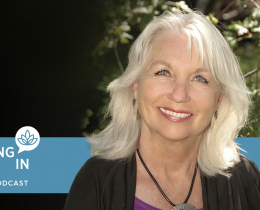Lois: Your book, Polishing the Mirror, reminds us to live from our spiritual heart, which is a regular ongoing practice. What is the most important thing that you are learning as you continue to "polish" your own "mirror"?
Ram Dass: I’m learning about love. I’m learning that God is love. That all things—like trees and cars and everything—are made of love. And that I am made of love. That’s radiance. It’s insight. I’m learning how to identify with my soul rather than my ego. So the soul is just love, love, love.
Lois: Any advice on embracing the love? I think it’s a struggle for so many people.
Ram Dass: I’m a bhakti yogi. Therefore I go the path of love. The path from ego to soul is to identify with soul. I am love. I am loving awareness. I am loving awareness. I am loving awareness. I am loving awareness. That’s what it’s like. Once you get loving awareness in your heart, you have to be loving and see love in your environment.
Lois: What advice can you give to people who struggle with anger, who see it as something outside of their spiritual practice?
Ram Dass: Anger is thoughts. Once I get angry, I identify my thoughts as angry, and I say to myself, “What am I doing here?” That question pushes me to identify with my witness, which is part of my soul. That witness witnesses the anger, and I identify with the witness, so I don’t have to identify with the anger. You go by and you witness the anger. Witnessing is not anger. You witness why you are angry. So what? So what? And it goes like that.
We should view suffering and imperfections in our thinking as being put there for stepping stones to God. If I feel anger…it’s making that real for me to be the witness.
Lois: You write beautifully about aging, dying and embracing the flow of life. What advice do you have for people who are struggling with aging? It can be at any age. I know people who are struggling turning 30. I know people who are struggling turning 80. What advice can you give to help people embrace this, and turn it into a positive practice?
Ram Dass: Tell them to make friends with change. Aging is just change. Change in friends, in culture, in family, in memory, and in your body. Oh boy, change! Now they could identify with their soul. Their soul is not in time and not in space. The soul is eternal. And your mind and body are in space and time. A birthday celebration for me, for example, is something I don’t want because it sucks me into time. It’s only my body that you’re having a birthday for, not me.
Aging is wonderful. Of course it’s hard; hardness is part of that wonderful. When you’re keeping love in your heart, pains and aches, you can love them, too. You birth them. All the pains I have, they are old friends.
Lois: You’ve spent a lot of your life being with people as they die. One of the things you said you were told that really resonates with me is, “dying is perfectly safe.” Aging and fear are connected and fear and death are connected. Any advice to help people with this?
Ram Dass: Train your mind to plumb the moment. Don’t live in the past. Don’t live in the future. All you know is what is here. I’m 83. I’m having a beautiful time. My body’s aging and I don’t compare it to the past or future. I have been studying after-death experiences and talking with people like Emmanuel, my friend “over there.” I don’t have any fear after death. My soul does not fear. The fear is that at the moment of death I will not be in the moment. And that’s why I’m living all life in the moment. In the moment. In the moment. In the moment. That’s practicing for death.
Once you start from your soul, it’s all love. The universe is all love. Then you can’t fear when you die. You go to soul-land. Soul-land is wonderful.
Lois: A number of years ago, you had a great surprise when you discovered you had a grown son. What has sudden fatherhood taught you about attachment, and has it redefined how you see yourself in the world?
Ram Dass: It changed my thinking about family. I used to say in lectures, if you want to see your sadhana and whether it is good, spend a week with your family!....Then my son came along and wanted to know what our family was like, and my family, through his eyes, they shined.
I don’t feel I’ve inhabited the role of father. That role doesn’t mean anything. He’s a good friend. We Skype weekly. He’s a good guy. And I’m bringing satsang and family together.



